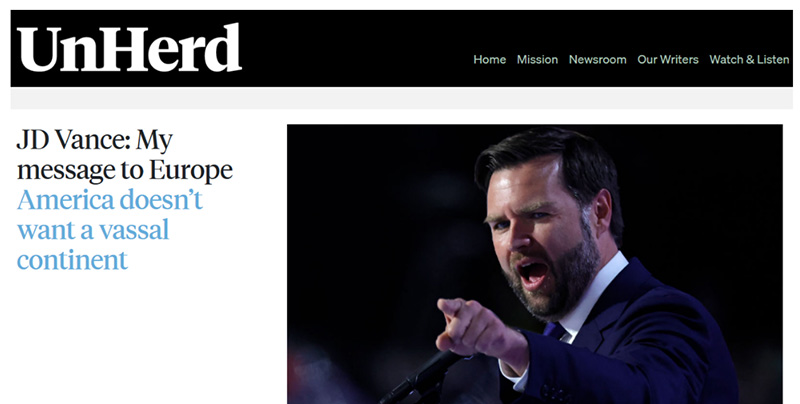
“It’s not good for Europe to be the permanent security vassal of the United States.” So says JD Vance during a phone conversation with UnHerd, his first major interview with a European outlet since taking office as Vice President. The backdrop is a week of turmoil on financial markets triggered by President Trump’s “Liberation Day” tariffs.
The decision to apply (and then partially rescind) hefty tariffs on European allies — combined with a barrage of harsh statements about Europe from Vance, both public ones and leaked private messages — has left many on the Continent wondering whether America can still be thought of as a friend.
Vance’s answer: yes, provided European leaders are prepared to assume a more independent role on the international stage, and to be more responsive to their own voters, especially when it comes to the question of immigration.
“I love Europe,” Vance tells me in a wide-ranging interview from his office in the West Wing, showcasing a diplomatic side that has not always been front and centre. “I love European people. I’ve said repeatedly that I think that you can’t separate American culture from European culture. We’re very much a product of philosophies, theologies, and of course the migration patterns that came out of Europe that launched the United States of America.”
Europe’s leaders are a different matter. Take Ukraine’s President Volodymyr Zelensky, who, in a recent interview with the American TV programme 60 Minutes, charged Vance with “somehow justifying” Russia’s invasion of his country. “I think it’s sort of absurd for Zelensky to tell the [American] government, which is currently keeping his entire government and war effort together, that we are somehow on the side of the Russians.” That kind of rhetoric, Vance says, “is certainly not productive”.
Beyond Ukraine, the American Vice President worries that European leaders are still failing to reckon with 21st-century realities on immigration, integration, and security.
“It’s not good for Europe to be the permanent security vassal of the United States.”
Vance says: “We’re very frustrated — ‘we’ meaning me, the President, certainly the entire Trump administration — that European populations keep on crying out for more sensible economic and migration policies, and the leaders of Europe keep on going through these elections, and keep on offering the European peoples the opposite of what they seem to have voted for.”
Immigration is at the heart of Vance’s palpable frustration with European leaders. He argues that, as in the United States, open-borders policies handed down from on high are poisonous to democratic trust. As Vance notes, “the entire democratic project of the West falls apart when the people keep on asking for less migration, and they keep on being rewarded by their leaders with more migration.”
Europe’s other blind spot, Vance says, is security. “The reality is — it’s blunt to say it, but it’s also true — that Europe’s entire security infrastructure, for my entire life, has been subsidised by the United States of America.” As recently as a quarter-century ago, “you could say that Europe had many vibrant militaries, at least militaries that could defend their own homelands”.
Fast-forward to today, Vance says, and “most European nations don’t have militaries that can provide for their reasonable defence”.
Vance’s message to the Continent, he says, is the same one delivered by Charles de Gaulle at the height of the Cold War, when the French president insisted on a healthy dose of independence from Washington. De Gaulle “loved the United States of America, but [he] recognised what I certainly recognise, that it’s not in Europe’s interest, and it’s not in America’s interest, for Europe to be a permanent security vassal of the United States”.
The administration’s lodestar will be “fairness”, Vance says. “I think it will lead to a lot of positive trade relationships with Europe. And again, we very much see Europe as our ally. We just want it to be an alliance where Europeans are a little more independent, and our security and trade relationships are gonna reflect that.”
All told, the Trump-Vance administration’s commitment to turning the page on globalisation as we knew it runs deeper than allies and adversaries alike might imagine. As Vance says: “We’re not on anybody’s side, we’re on America’s side.”
read more in our Telegram-channel https://t.me/The_International_Affairs

 11:28 17.04.2025 •
11:28 17.04.2025 •






















